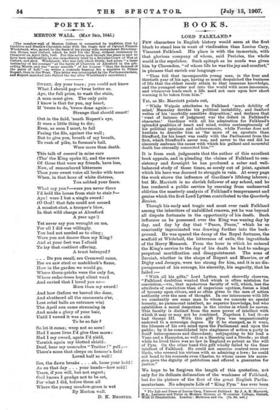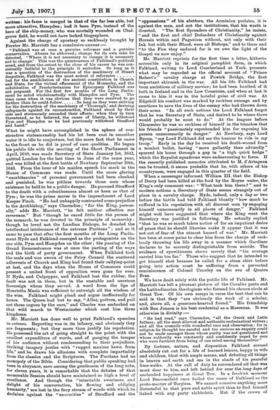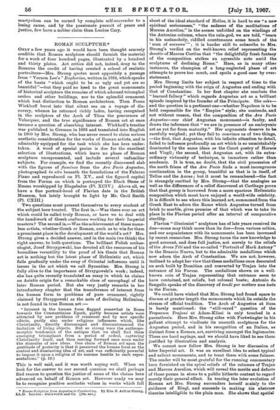BOOKS.
LORD FALKLAND.* FEW characters in English history would seem at the first blush to stand less in want of vindication than Lucius Cary, Viscount Falkland. His place is with the immortals, with that glorious company of whom, said Pericles, the whole world is the sepulchre. Such epitaph as he needs was given him by Clarendon, " of whose life he was the joy and comfort," in phrases that enrich our language :-
" Thus fell that incomparable young man, in the four and thirtieth year of his age, having so much despatched the business of life that the oldest rarely attain to that immense knowledge, and the youngest enter not into the world with more innocence, and whosoever leads such a life need not care upon how short warning it be taken from him."
Yet, as Mr. Marriott points out, "While Walpole attributes to Falkland much debility of mind,' Macaulay derides his political instability, and Sanford writes of his morbidly sensitive disposition,' and declares that want of balance of judgment was the defect in Falkland's character.' Gardiner with all his admiration for Falkland's splendid qualities of heart and mind, writes contemptuously of his political opinions and achievements, while Forster does not hesitate to describe him as 'far more of an apostate than Strafford, for his heart was really with the Parliament from the first, which Strafford's never was, and never to the end did he sincerely embrace the cause with which his gallant and mournful death has eternally connected him.' " It is from such judgments that the author of this excellent book appeals, and in pleading the claims of Falkland to con- sistency and foresight he has produced a sober and well- balanced study of those times, so sorely out of joint, against which his hero was doomed to struggle in vain. At every page the work shows the influence of Gardiner's lifelong labours ; but Mr. Marriott is no slavish follower of any school, and he has rendered a public service by rescuing from undeserved oblivion the masterly analysis of Falkland's temperament and genius which the first Lord Lytten contributed to the Quarterly Review.
Though his early and tragic end must ever rank Falkland among the inheritors of unfulfilled renown, yet he was beyond all dispute fortunate in the opportunity of his death. Such influence as he possessed over the King was waning day by day, and day by day that " Peace, Peace," which he so constantly ingeminated was drawing further into the back- ground. He was spared the decay of the Royal fortunes, the scaffold at Whitehall, the bitterness of exile, the ingratitude of the Merry Monarch. From the hour in which be entered the King's service to the day of his death he had to undergo perpetual mortification and disappointment. The sons of Zeruiah, whether in the shape of Rupert and Maurice, or of Digby and Jermyn, were too strong for him, and it is no dis- paragement of his courage, his sincerity, his sagacity, that he
failed :-
" With all his gifts," Lord Lytton most shrewdly observes, "Falkland doubtless wanted that which is often mistaken for conviction,—viz., that mysterious faculty of will, which, less the attribute of conviction than of imperious egotism, forces a kind of tyranny upon others, and so often gives to the men of action authority over the men of thought. In our intercourse with life we constantly see some man to whom we concede no special honesty, no paramount intellect, no superior knowledge, but who establishes a moral despotism in the circles in which he moves. This faculty is distinct from the mere power of intellect with which it may or may not be combined. Napoleon I. had it--so had George III. With this gift Pym was unquestionably endowed to a sovereign degree. By it be stamped, as it were, the likeness of his own mind upon the Parliament and upon the public : by it he consolidated into singleness of action a party in itself heterogeneous and discordant; subjugating to his lead a Vane and a Hampden, as well as a Raselrig and a Strode ; so that while he lived there was no law in England so potent as the will of Pym. On the other hand this gift wholly failed to the finer intellect of Falkland. He could not exercise control even over Hyde, who revered his virtues with so admiring a love : he could not bend to his counsels even Charles, to whose cause his acces- sion gave the dignity of patriotism and offered a guarantee for justice."
We hope to be forgiven the length of this quotation, not only for its delicate delineation of the weakness of Falkland, but for its picture of the first of the great English Parlia- mentarians. No adequate Life of " King Pym" has ever been
* The Life and Times of Lucius Cary, Viscount Falkland. By J. A. R. Marriott, MA., Lecturer and Tutor in Modern History at Worcester College, Oxford. With 23 Illustrations. London : Methuen and Co. [7s. (id. net.]
written: his fame is merged in that of the far less able, but more attractive, Hampden ; bad it been Pym, instead of the hero of the ship-money, who was mortally wounded on Chal- grove field, he would not have lacked biographers.
Against the charge of apostasy so recklessly brought by
Forster Mr. Marriott has a conclusive answer:—
"Falkland was at once a genuine reformer and a genuine conservative. Abuses he abhorred; change for its own sake he detested. Where it is not necessary to change it is necessary not to change.' This was the quintessence of Falkland's political creed, and from the outset to the close of his career he was con- sistently faithful to the principle it embodies. So long as it was a question of the destruction of the machinery of Stuart despotism, Falkland was the most ardent of reformers but for the annihilation of the ancient constitution in Church and State, for the virtual effacement of the Monarchy, and the substitution of Presbyterianism for Episcopacy Falkland was not prepared. For the first few months of the Long Parlia- ment he acted wholeheartedly with Hampden and Pym. The time came when it was obvious that they were resolved to go farther than he could follow So long as they were striving for the destruction of the machinery of Thorough,' and devising safeguards against its reconstruction, Falkland stood by their side and strenuously seconded their efforts ; when they in turn threatened, as he believed, the cause of liberty, he withstood Pym and Hampden as he had previously withstood Strafford and Laud."
What he might have accomplished in the sphere of con- structive statesmanship had his lot been cast in smoother water it is idle to conjecture, but the mere fact that he came to the front as he did is proof of rare qualities. He began his public life with the meeting of the Short Parliament in
April, 1640, was made Secretary of State January 1st, 1642, quitted London for the last time in June of the same year, and was killed at the first battle of Newbury September 20th, 1643. From the hour of his maiden speech his mark in the House of Commons was made. Until the more glaring
" exorbitancies " of personal government had been checked and punished, he was pitiless towards those men whose existence he held to be a public danger. He pursued Strafford to the death with a relentlessness almost as keen as that of
Pym ; he was the prime mover in the impeachment of Lord Keeper Finch. " He bad unhappily contracted some prejudice to the Archbishop," says Clarendon; "for the King, person. ally," adds Mr. Marriott, " he felt neither affection nor reverence." But "though he cared little for the person of the monarch, he was devoted to the principle of monarchy : though be loved not the Laudian Bishops, he dreaded the intellectual intolerance of the extreme Puritans " ; and so it came to pass that after the first months of the Long Parlia- ment Hyde and Falkland emerged as the protagonists on the one side, Pym and Hampden on the other ; the passing of the Grand Remonstrance was at once the parting of the ways and the birth of party government. When Falkland took the seals and was sworn of the Privy Council the scattered adherents of Church and King had found their rallying-point at last, and the days when the House of Commons could present a united front of opposition were gone for ever.
If Hyde, and Culpepper, and Falkland lost the rubber, the fault was not in them, but in the unstable and uxorious Sovereign whom they served. A word from the lips of Henrietta Maria was sufficient to outweigh all the wisdom of the wise. Falkland might plead and argue ineffectually for hours. The Queen had but to say, "Allez, poltron, and pull out those rogues by the ears," and Charles was embarked on that wild march to Westminster which cost him three kingdoms.
Mr. Marriott has done well to print Falkland's speeches in extenso. Reporting was in its infancy, and obviously they are fragments ; but they more than justify his reputation.
He possessed the art of going straight to the point with the smallest expenditure of words, and of gauging the temper of his audience without condescending to their prejudices. Striking imagery jostles with "rugged maxims hewn from
life," and he draws his allusions with complete impartiality from the classics and the Scriptures. The Puritans had no monopoly of the Bible. Considering that public speaking had been in abeyance, save among the gentlemen of the long robe, for eleven years, it is remarkable that the debates of that memorable Session should have maintained so high a level of excellence. And though the "inimitable sweetness and delight of his conversation, his flowing and obliging humanity," are lost in the fiery stream of words with which he declaims against the " enormities " of Strafford and the " oppressions " of his abettors, the Arminian prelates, it is against the men, and not the institutions, that his wrath is directed. " The first Spreaders of Christianity," he insists, " and the first and chief Defenders of Christianity against Heresie within and Paganism without, not only with their Ink but with their Blood, were all Bishops," and to them and "to the Fire they endured for it we owe the light of the Gospel we now enjoy."
Mr. Marriott reprints for the first time a letter, hitherto accessible only in its original pamphlet form, in which Falkland, writing to Lord Cumberland at York, presents what may be regarded as the official account of " Prince Robert's" cavalry charge at Powick Bridge, the first important skirmish in the war. All his life Falkland had been ambitious of military service; he had been baulked of it both in Ireland and in the Low Countries, and when at last it came to him it was in the hateful guise of civil war. At Edgehill his conduct was marked by reckless courage and by exertions to save the lives of the enemy who bad thrown down their arms. "In all such actions the Lord Falkland forgot that he was Secretary of State, and desired to be where there would probably be most to do." At the leaguer before Gloucester be was so reckless of himself in the trenches that his friends " passionately reprehended him for exposing his person unnecessarily to danger." At Newbury, says Lord Byron, " my Lord Falkland did me the honour to ride in my troop." Early in the day he received his death-wound from a musket bullet, having "more gallantly than advisedly" spurred his horse through a gap in "a high quick hedge"
which the Royalist squadrons were endeavouring to force. If
the recently published memoirs attributed to M. d'Artagnan can be trusted, it seems probable that he, with others of his countrymen, were engaged in this quarter of the field.
When a messenger informed William III. that the Bishop of Derry had been killed at the ford by the Boyne water, the King's only comment was : " What took him there P " and to modern notions a Secretary of State seems strangely out of place in a cavalry charge. Hyde, indeed, only a day or two before the battle bad told Falkland bluntly " how much he suffered in his reputation with all discreet men by engaging himself unnecessarily in all places of danger." Falkland might well have suggested that where the King went the Secretary was justified in following. He actually replied "that he was so much taken notice of for an impatient desire of peace that he should likewise make it appear that it was not out of fear of the utmost hazard of war." Mr. Marriott has been at some pains to clear him from the charge of reck- lessly throwing his life away in a manner which Gardiner declares to be scarcely distinguishable from suicide. The
evidence of eyewitnesses shows merely that "his courage carried him too far." Those who suggest that he intended to get himself shot because he called for a clean shirt before going into action must be suffering from a perverted reminiscence of Colonel Crawley on the eve of Quatre
Bras.
We have dealt solely with the public life of Falkland. Mr. Marriott has left a pleasant picture of the Cavalier poets and the Latitudinarian theologians who formed his chosen circle at
Great Tew. Of his own essays in verse the best that can be said is that they "are obviously the work of a scholar, and, above all, a generous-hearted friend." His friendship with Ben Jonson is his best credential as a Maecenas. It was otherwise in divinity :-
"He had read," says Clarendon, "all the Greek and Latin fathers ; all the most allowed and authentic ecclesiastical writers ; and all the councils with wonderful care and observation: for in religion he thought too careful and too curious an enquiry could not be made amongst those whose purity was not questioned and whose authority was constantly and confidently urged by men who were furthest from being of one mind among themselves."
By fortune, nature, and disposition Falkland seemed absolutely cut out for a life of learned leisure, happy in wife
and children, blest with ample means, and debating all things in heaven and earth and sea in the shade of his peaceful
lime-walks. At the call of duty he surrendered all that was most dear to him, and left behind for ever the long days of unclouded happiness at Great Tew. In a freakish moment Lord Beaconsfield once hailed the name of Falkland as the proto-martyr of Toryism. We cannot conceive anything more distasteful to that pure and noble spirit than to find himself
linked with any party shibboleth. But if the crown of martyrdom can be earned by complete self-surrender to a losing cause, and by the passionate pursuit of peace and justice, few have a nobler claim than Lucius Cary.








































 Previous page
Previous page